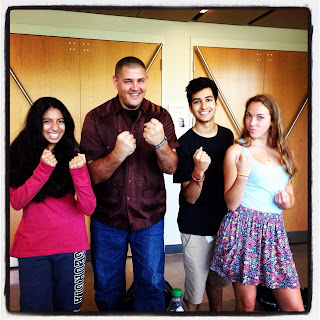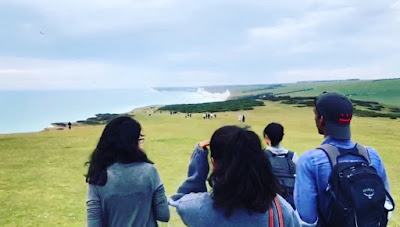Pulitzer Prize Author Visits Georgia Tech
At this point, this is a few months overdue. But better late than never, right?
How much do you know about North Korea? It tends to be the butt of an unfortunate number of jokes, but have you ever thought about why?
Stanford professor and author Adam Johnson did. And in the process, he wrote The Orphan Master's Son, a novel that combines the unfortunate truth of North Korea with the favorite American tale of becoming something from nothing, zero to hero, the rise and victory of the underdog. I read this book for my Honors English 1102 class at Georgia Tech. And shortly after we finished the novel, Adam Johnson came to visit, giving a talk about the book as well as a seminar on trauma writing.
We didn't really know what to expect from Adam, but he was definitely a surprising character to meet. In fact, when we asked to take a picture with him, this was the pose he suggested:
Besides meeting with John Green for what was probably 30 seconds in January 2012, this was my first real interaction with an author. The twelve-year old who always dreamed of being a writer awoke inside of me. Talking to him was fascinating. Being able to tell him that his writing was real and inspired me, was amazing. But best of all was attending his seminar on trauma writing later than afternoon. It was interesting to analyze all these different aspects of story telling and how the realness of experiencing something can make it a much more powerful story. I never really appreciated how difficult writing, especially writing about something serious or tragic, can be. How do you make it feel authentic without exaggerating it? How do you sound credible without undermining the reality? There's a reason people say it's easier to write what you know.
But that doesn't mean you can't try to write something you don't. Adam Johnson did it. And won a Pulitzer Prize. It seems things worked out pretty well for him. The seminar kind of presented a challenge to me: write. Just write. Anything and everything. Adam Johnson did more than write an emotional and suspenseful novel, he got me excited about writing again. It had been a while since I felt that. I even forgot what it feels like. But it's a great and powerful feeling. In this world of chaos and confusion, where we have so little control, taking back the pen gives us just a bit of control in a tiny aspect of life. I think that's something important to remember as I continue down this college road. As chaotic and overwhelming and scary most of this is, I will always still be in control. I decide my major. I decide what study abroad programs to go on or what internships to take. Everything is what I make it. The question is, do I stick to what I know or do I embark on adventures into the risky unknown?
How much do you know about North Korea? It tends to be the butt of an unfortunate number of jokes, but have you ever thought about why?
Stanford professor and author Adam Johnson did. And in the process, he wrote The Orphan Master's Son, a novel that combines the unfortunate truth of North Korea with the favorite American tale of becoming something from nothing, zero to hero, the rise and victory of the underdog. I read this book for my Honors English 1102 class at Georgia Tech. And shortly after we finished the novel, Adam Johnson came to visit, giving a talk about the book as well as a seminar on trauma writing.
We didn't really know what to expect from Adam, but he was definitely a surprising character to meet. In fact, when we asked to take a picture with him, this was the pose he suggested:
Besides meeting with John Green for what was probably 30 seconds in January 2012, this was my first real interaction with an author. The twelve-year old who always dreamed of being a writer awoke inside of me. Talking to him was fascinating. Being able to tell him that his writing was real and inspired me, was amazing. But best of all was attending his seminar on trauma writing later than afternoon. It was interesting to analyze all these different aspects of story telling and how the realness of experiencing something can make it a much more powerful story. I never really appreciated how difficult writing, especially writing about something serious or tragic, can be. How do you make it feel authentic without exaggerating it? How do you sound credible without undermining the reality? There's a reason people say it's easier to write what you know.
But that doesn't mean you can't try to write something you don't. Adam Johnson did it. And won a Pulitzer Prize. It seems things worked out pretty well for him. The seminar kind of presented a challenge to me: write. Just write. Anything and everything. Adam Johnson did more than write an emotional and suspenseful novel, he got me excited about writing again. It had been a while since I felt that. I even forgot what it feels like. But it's a great and powerful feeling. In this world of chaos and confusion, where we have so little control, taking back the pen gives us just a bit of control in a tiny aspect of life. I think that's something important to remember as I continue down this college road. As chaotic and overwhelming and scary most of this is, I will always still be in control. I decide my major. I decide what study abroad programs to go on or what internships to take. Everything is what I make it. The question is, do I stick to what I know or do I embark on adventures into the risky unknown?



Comments
Post a Comment